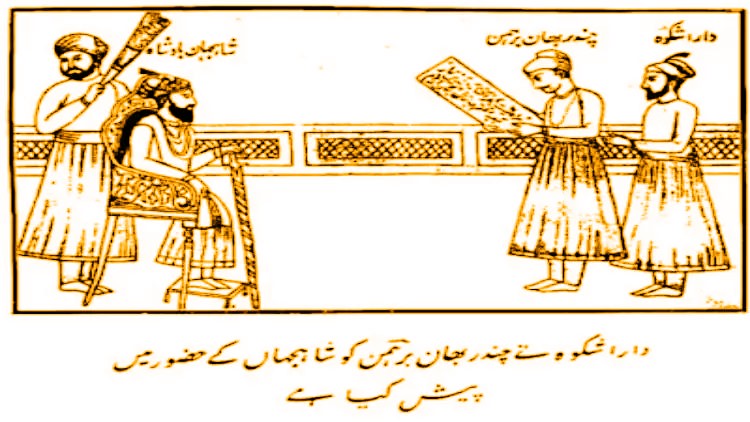
Ghaus Siwani
History is not always fair as many names have got lost in its labyrinth. One such name is of Chandrabhan Brahman, a highly valued minister in the Mughal Emperor Shahjehan’s court, who is credited with writing the first Diwan (collection) of Urdu poetry.
Chanderbhan’s proximity to Shah Jehan made the latter entrust him the responsibility of education and upbringing of his favourite son, Prince Darashikoh, who rose to become a literary figure.
To give context to Chanderbhan’s role in evolution of Urdu, let me explain that Urdu is not only a language; it’s a civilization; the heritage of India's inclusive Ganga-Jamni culture; the legacy of unity and brotherhood. It evolved in the plains of India. No wonder Urdu has words from different languages. Just as Muslims from Persia, Turkestan, Arabia and Central Asia nurtured the sapling of Urdu, so did Hindus, Sikhs and Jains of India.
Among the first well known Urdu aficionados is Chandrabhan Brahman, who lived before Wali Deccani. Though on records, it’s Deccani who is credited with writing the first Diwan (collection) of Urdu poetry, the fact is that Wali Deccani was born in 1669, six years after the Chanderbhan’s death!
History also remembers Chandrabhan Brahman, as Chandrabhan Zanardar (wearer of the holy thread).
Born into a Kashmiri Hindu family in Lahore, Chandarbhan was educated in the madrasas of Agra that had some of the most famous teachers of that time. He received his early education from Mullah Abdul Hakim Sialkoti, who was also the caretaker of the Taj Mahal complex.
It seems that Chandranbhan had reached the Mughals after working for King Afzal Khan. He held the powerful position of ‘Wazir Kul’ (Minister, overall in charge). Only after Khan died he moved to the Mughals.
Chanderbhan remained in the service of Shah Jehan for 30 years. He was very close to the emperor and used to write his diary. Chanderbhan stayed with the king during his travels and wrote down the circumstances of his travels. Later, he was given the responsibility of writing down the details of the Emperor’s visit to various countries. For historians, Chanderbhan’s books are the key source of information on Shah Jehan's reign. Most importantly, Shahjehan trusted him with the upbringing and education of Darashikoh, the heir apparent.
There is mention of Chanderbhan’s three brothers and a son in history. His two brothers lived as mendicants and yet but he maintained a good relationship with them. He mentions both of them with great respect.
His one brother Uday Bhan was employed in the office of Nazim Aqil Khan of Shah Jahanabad.
A Brahmin by caste, Chanderbhan was a man of good temperament and disposition of a Sufi. He mentions Hindu rituals with reverence in his writings.
He had watery eyes due to a problem of burning sensation in his eyes. He wrote letters of recommendation to various officials to help the needy people.
Chanderbhan’s Persian prose is known for its simplicity; the same is the case with his poetry.
In the Mughal period, there was a fashion of complicated writings with deliberate ambiguity. However, Chanderbhan took a stand against it. His Diwan (book) consists of ghazals, quatrains and sections. He used Islamic imagery and all shades of human emotions that were used by Muslim poets of that era. Like most poets of that era, Chanderbhan also dwelt in emotions of love, the conditions of love and the stages of Sufism.
Chanderbhan was an Urdu-Persian poet and also a great scholar of Arabic, Persian and Sanskrit. He authored several books on Sufism and literature. Some of his books mentioned in history are: Manshaat, Chaharchaman, Guldasta,Tahfat-ul-Fashai, Jumu'at-ul-Faqra'i, Tahfat-ul-Anwar and Diwan of Poetry etc.
Chanderbhan is also considered as the author of the first Diwan of Persian language. He seems to be a follower of Hazrat Amir Khusro, whose poetry was about the unity of human beings.
Chanderbhan is one of the few Persian-language Indian poets who have been recognized by the people of Iran. His poetry dwelt in subjects of Tawhid, Sufism andVedanta.
Besides an Urdu poet, Chanderbhan was a good Persian prose writer. Obviously, a linguist king like Shah Jahan could not have entrusted the job of writing his diary to a non-linguist. He also worked on compiling Sanskrit epistemology.
What distinguishes Brahman from others is that he was not only the first Diwan-e-Hindu poet of Persian but also the first Diwan-e-Shair of Urdu language.
Sadly, Brahman's Urdu Diwan has been lost to the ravages of time, but his poems that are found in other texts have enriched Urdu literature. His poetry is about love and fun.
(Ghaus Siwani of Awaz-the Voice is an author of 23 books on Sufism and literature)
